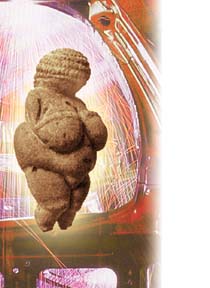Webmaster
Site map
FAQ
Remaining Human

|
In the face of our growing dependence on technology Public Forum May 25 8:00 PM to 10:00 PM May 26 9:00 AM to 6 PM Frederick Wood Theater, University of British Columbia In the face of our growing dependency on technology and complex organizational systems of human invention, there is a concern that the foundation of our humanness may become obscured in our rush towards "progress" and the temptation to become "cyborgs".
|
Participation in the Remaining Human Forum is included in the
ASC 2001 Conference registration as long as space remains available.
Seats are guaranteed for ASC members who pre-register by April 1.
(Regular fee for this forum is CD$150, half price for unwaged.)
Remaining human registration and information available at the University of British Columbia website
In conjunction with our annual conference, ASC is co-sponsoring a
public forum "Remaining Human" with CSCI at the University of
British Columbia, the Sweeney Foundation, and Common Ground Magazine.
Participation in the forum is included with the ASC 2001 conference
fee for those registering before April 25. After April 25 ASC
members may register for CD$100*, or come on a standby basis. The
regular admission is CD$150*.
The Remaining Human Forum is co-sponsored by the Center for Curriculum and Instruction at the University of British Columbia and the Sweeney Family Charitable Organization as part of a series of events including a seminar and a summer session course.
Centre for the Study of Curriculum and Instruction
(http://www.csci.educ.ubc.ca)
CSCI is a graduate program unit within the Faculty of Education at the University of British Columbia. Scholarly activities create opportunities for students to study and interpret broad issues that shape pedagogical understandings and actions amidst differences in culture, language, and context, by re-imagining pedagogy,
Sweeney Foundation
The Sweeney Family Charitable Foundation was incorporated in British Columbia as a non-profit society in 1987. The purposes of the society are to fund, facilitate, promote and carry out programs that teach an appreciation of the cultural richness of the many communities that comprise the people of Canada.
Speakers at the Remaining Human Public Forum
Dr. Humberto Maturana
Our genome does not determine us (May 25)
Dr. Maturana, a neurobiologist and philosopher from the University of Santiago in Chile, is most widely known for his research on "what is life", through which he developed the notions of autopoiesis and structural coupling. His research has expanded to develop an understanding of how we humans compose reality through our living in language (constitutive ontology) and to distinguish what is uniquely human and how we may have evolved that; namely through an expansion of the biology of love. Dr. Maturana is author of many books, including Autopoiesis and Cognition, and the Tree of Knowledge which is published in many languages. He is internationally renowned in cybernetics and systems, family therapy, health care and education.
Dr. Maturana will serve as a commentator to integrate the presentations of the other speakers and to reflect on how cybernetics may contribute to furthering our understanding of the concerns and views that they present.
A transcription of Dr. Maturana's presentation is now available here at the ASC website:
http://www.asc-cybernetics.org/2001/RH-Maturana.htm
Dr. Brian Swimme
A responsible locus in the cosmos
Dr. Swimme is a mathematical cosmologist on the graduate faculty of the California Institute of Integral Studies in San Francisco. His primary field of research is the nature of the evolutionary dynamics of the universe. His central concern is the role of the human within the Earth community. Dr. Swimmes' ideas have been featured at conferences sponsored by the American Association for the Advancement of Science, the United Nations, World Bank, UNESCO and the International Montessori Association. He has published several books including The Hidden Heart of the Cosmos, The Universe is a Green Dragon, and The Universe Story with Thomas Berry. Brian Swimme received his Ph.D. in gravitational dynamics.
Dr. Riane Eisler
Relationship and social becoming
Dr. Eisler is best known for her international bestsellers The Chalice and The Blade, Sacred Pleasure, and most recently Tomorrow’s Children. The former has been referred to by the anthropologist Ashley Montagu as "the most important book since Darwin's Origin of Species." It has been translated into 17 languages including Chinese, Spanish, Russian, and Japanese. She is a cultural historian and evolutionary theorist who has done pioneering work in human rights, expanding the vision of international organizations to include the rights of women and children.
Dr. Candace Pert
The matter of emotions
Dr. Pert is an American neuroscientist and pharmacologist, best known for her discovery of the constellation of neuropeptides which for the biochemical ground for emotions and act as the extended operation of the body's cognitive system. Pert's discovery of opiate receptors in the early 1970s raised the question of why receptors exist for opiates, substances that do not naturally occur in the body. She is the author of the popular book, Molecules of Emotion.
Dr. David Loye
Love and Human Evolution
Social psychologist, systems-theorist, and futurist David Loye is the author of widely respected books on the use of the brain and mind in prediction, political leadership, race relations, and is the developer of new theories of moral sensitivity and evolution. His concern for human evolution is expressed in his book, Darwin’s Lost Theory, as well as in his current work A Fully Human Theory of Evolution. Loye is a co-founder of the Center for Partnership Studies, the new Society for the Study of Chaos Theory in Psychology and the General Evolution Research Group, a multidisciplinary group composed of international scholars.
The Remaining Human Forum is co-sponsored by the University of British Columbia as part of a series of events on this theme.